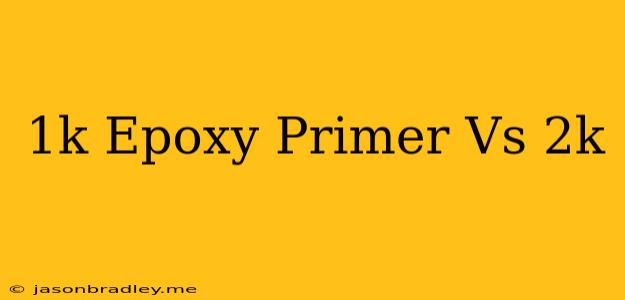1K vs 2K Epoxy Primer: Which is Right for You?
Epoxy primers are essential for achieving a durable and long-lasting finish on your project, whether it's a car, motorcycle, or any other surface. But with two main types available – 1K and 2K – choosing the right one can be confusing. Here's a breakdown of the key differences and considerations to help you decide which epoxy primer is best for your needs.
1K Epoxy Primer
What is it?
1K epoxy primer is a single-component product that requires only a hardener to activate the chemical reaction that creates a durable coating. This means you can mix it right before application and it's ready to go.
Pros:
- Easy to Use: Simple mixing and application process makes it convenient for DIYers.
- Cost-Effective: Generally more affordable than 2K epoxy primers.
- Lower VOCs: Typically contains fewer volatile organic compounds, making it more environmentally friendly.
Cons:
- Lower Durability: Provides less robust protection compared to 2K epoxy primers.
- Shorter Pot Life: Once mixed, it has a shorter working time before hardening.
- Less Chemical Resistance: May not be as resistant to solvents, chemicals, and UV exposure.
2K Epoxy Primer
What is it?
2K epoxy primer consists of two separate components: a resin and a hardener. These are mixed together right before application, triggering a chemical reaction that creates a hard, durable coating.
Pros:
- Exceptional Durability: Offers superior resistance to scratches, abrasion, chemicals, and UV damage.
- Strong Adhesion: Provides excellent bonding to various substrates, ensuring a long-lasting finish.
- Longer Pot Life: Provides more time to work with the primer before it hardens.
Cons:
- More Complex to Use: Requires careful mixing and measuring of both components.
- Higher Cost: Generally more expensive than 1K epoxy primers.
- Higher VOCs: Often contains higher levels of volatile organic compounds.
Choosing the Right Epoxy Primer
Ultimately, the best epoxy primer for you depends on your specific needs and budget.
Consider 1K epoxy primer if:
- You're a DIYer with limited experience.
- You're on a tighter budget.
- You need a primer for a non-critical application.
Consider 2K epoxy primer if:
- You require the highest level of durability and protection.
- You're working on a project that requires excellent adhesion.
- You have the time and experience to work with a two-component system.
Important Considerations
- Substrate: Ensure the epoxy primer you choose is compatible with the surface you're working on.
- Application: Determine the best application method (spray, brush, roller) for the primer you select.
- Environmental Conditions: Consider the temperature and humidity when applying the epoxy primer.
- Safety: Always follow the manufacturer's safety guidelines and wear appropriate protective gear when working with epoxy primers.
By carefully considering these factors, you can make an informed decision and choose the best epoxy primer for your project.
